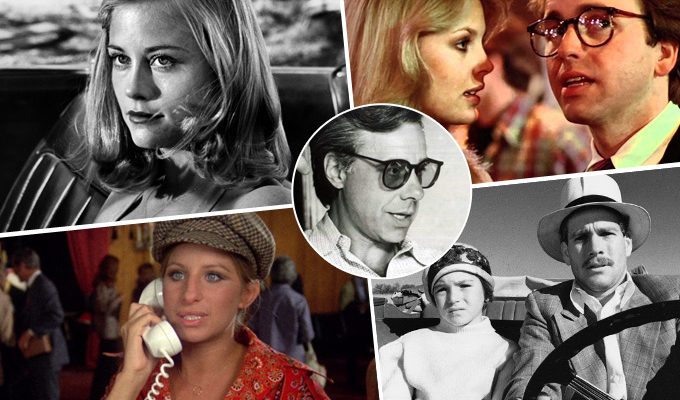 “Mask” (1985)
“Mask” (1985)
There’s nothing as tragically unhip as sincerity, which means that Bogdanovich’s mid-80s hit, based on a true story that literalizes the idea of The Beauty Within, cannot but feel terribly unfashionable now — almost a byword for the kind of mawkish, sentimental Housewife’s Favorite that keeps the Lifetime Channel going. But fashion be damned, because “Mask” is really good — the best possible version of itself — marked by great performances across the board, that, from the opening frame, conspire to make you forget the manipulation machine in which you are involved. Helping that process too is Bogdanovich’s filmmaking, which, again coupled with Kovacs’ understatedly romanced cinematography, keeps a certain cool remove in place, allowing the actors’ bigger moments to feel true and tremendous, without becoming histrionic. Based on the real, short life of Rocky Dennis (Eric Stoltz, in Oscar-winning make up), a boy afflicted with a rare disease that curtailed his life as well as disfiguring his face, the film is also (perhaps primarily) a defense of “alternative lifestyles.” Rocky’s mom, Rusty (deserved Cannes Best Actress-winning Cher), is a single mother, maintaining a drug habit and an unapologetically casual sex life, who has embedded Rocky into an unconventional “family” of bikers, and yet the portrayal of her style of motherhood is inherently, immensely sympathetic. Glowing with pride and love and complete acceptance when she looks at her “freakish” son — for all her flaws and fuck ups, she’s simply one of the greatest screen mothers ever. Sam Elliott is ruggedly masculine as her on-again off-again biker beau, Laura Dern has a lovely freedom in her role as the blind girl Rocky falls for, and the collective Greek chorus of bikers and schoolkids are solid in sometimes very shorthanded roles. Perhaps best of all here is Stoltz, who plays Rocky with a sensitivity that is touching, but also with the cocky humor and oddly secure confidence of a good-looking guy, underneath it all. The conclusion may be pat — hell, the whole thing is way too neat to be anything like life — but it’s executed with such guileless faith in the goodness of its intentions, that if you’re not crying, you’re simply not watching.
 “The Cat’s Meow” (2001)
“The Cat’s Meow” (2001)
The late ’80s and the ’90s in general weren’t hugely kind to Bogdanovich (even he concedes that awful 1988 Rob Lowe vehicle “Illegally Yours” was one of his worst), but he came back into critical favor with, if not a roar then at least a kittenish purr, making 2001’s “The Cat’s Meow.” A long-gestating project reportedly based on an anecdote related to Bogdanovich by Orson Welles, it saw him return to a luxurious period setting (this time an immaculately appointed 1920s yacht on which a variety of famous people are having a party) and deliver a nicely observed, gently acidic tragicomedy — the exact vein that many of his most successful films tapped. It’s not quite one for the ages, but the sprawling cast, most of whom play real-life people, gamely mine the script’s twists: Edward Herrmann as William Randolph Hearst; Kirsten Dunst as Hearst’s love, Marion Davies; Eddie Izzard as a flirtatious Charlie Chaplin; Joanna Lumley as romantic novelist, Elinor Glyn; Jennifer Tilly as gossip columnist, Louella Parsons; and Cary Elwes as the doomed producer, Thomas Ince, whose mysterious death aboard the yacht the film purports to explain. While it’s based on a gossipy, salacious true story, and suggests that Ince was the victim of mistaken identity and a bullet that was intended for Chaplin, with whom Hearst believed Davies was having an affair, the film is less splashy than that sounds, more muted and melancholic in tone, despite some funny, bitchy, bitten-off dialogue. Set into her sumptuous ’20s costuming like a pearl, Dunst cuts an almost tragic figure as the woman that these “great” men might fight and kill for, with the shallowness of the high-life partying lifestyle evoked not just in its decadence and excess but also in its emptiness. Everyone aboard has an agenda, and so the film takes on a certain satirical element as the yacht becomes a metaphor for Hollywood itself, where life is cheap, secrets are leverage, and to be loved is to be trapped and owned. Attractively played and handsomely mounted, it’s a slight film, “solving” an insoluble mystery that no one really remembers nowadays anyway, but it does boast that unusual texture of sadness, and a best-ever description of lonely, exotic Hollywood as “a place just off the coast of Planet Earth.”
Next tier down, there are some other Bogdanovich titles that, if not quite essential, still have flashes of greatness. “Texasville” is a reunion/sequel to “The Last Picture Show” that is perhaps better viewed in isolation rather than as a middle-aged echo of greatness past; “Noises Off” is an entertaining, if stage-bound, all-star adaptation of a rambunctious play; and “The Thing Called Love” is a warm hearted, if rather low-stakes, drama featuring nice performances from Samantha Mathis, Sandra Bullock, and River Phoenix. And, of course, Bogdanovich has always popped up regularly as an actor, most notably in his recurring role on “The Sopranos.”
Did we miss out your favorite Bogdanovich film? Anyone out there eagerly agitating for the rehabilitation of “Illegally Yours“? Let us know below, or just use the comment box to further sing the praises of “Paper Moon,” because goddamn if that film isn’t just about perfect.
–with Nikola Grozdanovich and Rodrigo Perez

